September/October 2022
Dear Friends,
I hope this edition of the Princeton in Africa Fellows Flyer finds you and your families well. Welcome to our 2022-23 cohort! Our 2022-23 Fellows are about 3 months into their fellowships and we are happy to share some of their experiences working on-site on the African continent. The 2022-23 cohort is the first fellowship class to begin their fellowships fully on-site since 2020. We are grateful to our dedicated community of supporters and friends for helping us thrive in a virtual setting before we were able to safely transition our Fellows to their host countries. Read on to hear about what Kyilah Terry (IRC Kenya), Asa Cooper (IRC Somalia based in Kenya) and Dylan McAndrew (ASE in Benin) have been up to during the first few months of the fellowships.
September and October are exciting times in our program cycle. Our applications for the 2023-24 fellowship year closed on October 26th, 2022 at 11:59 PM EST. We look forward to reviewing applications and welcoming more young leaders into our network of like-minded, passionate professionals from all over the world.
PiAf has shared helpful resources and arranged informative events for our prospective applicants this cycle. We graciously thank our committed alumni body for showing support for our program during this recruitment process. With their involvement, we hosted three alumni-centered panels:
The Black Alumni Panel featured Razan Eltayeb (Population Services International, Kenya, 2019-2020), Nduulwa Kowa (Emerging Public Leaders, Ghana, 2021-2022) Jillian Randolph (CCBRT, Tanzania, 2019-2020, Gordon Taylor (Kucetekela Foundation, Zambia, 2013-14) and Malcolm Temple World Food Programme (WFP), Rwanda, 2015-16)
The Professional Sector Overview Panel featured Jennifer Bryan (Global Partnerships, Kenya, 2019-2020), Adrienne Clermont (UN World Food Programme, Benin, 2009-2010), Liviya David (HelpAge International, Kenya, 2017-2018) Kwame Gayle (Maru-a-Pula, Botswana, 2013-2014) and Ciara Nutter (Mpala Research Centre & Wildlife Foundation, Kenya, 2018-2019)
We welcomed two of our newest board members, Ettie Philitas and Amaka Anku, alumni of our program, to our 2022 Alumni Legacies panel. Amaka Anku (2004-2005 Fellow with International Crisis Group, Senegal & 2006-2007 Fellow with International Rescue Committee (IRC), Democratic Republic of Congo) is head of the Eurasia Group’s Africa practice and Ettie Philitas (2009-2010 Fellow with African Leadership Academy, South Africa) is an Executive Director with J.P. Morgan Asset Management. This panel was skillfully moderated by PiAf Alumni Board Member, Kevin Nigarura (2016-2017 Fellow with Maru-a-Pula, Botswana).
In September, PiAf hosted a small gathering in New York City to celebrate our supporters and long-time friends of our program. Our donors are integral to our operations, to the success of our program and to the achievements of our Fellows. We were delighted to see some of them in person on an impactful night. Thank you again to David and Susanna Huntington for hosting us in their lovely home in New York. For more details about our Donor Appreciation Night, please view our September 2022 newsletter and subscribe to stay up-to-date on future newsletters.
Our Board of Directors pledged $25k to be matched by our network. As we head toward the end of this year, we graciously ask our supporters to double their impact. With your gift, no matter the size, you can help us continue to develop the young leaders of tomorrow as they contribute to some of the most impactful organizations in Africa today. Help us match our Board of Directors’ commitment by December 31st, 2022.
Be sure to follow us on Instagram, LinkedIn, Facebook, Twitter and Youtube to see more updates about our 27 current Fellows. Please enjoy this video from our class of 2022-2023.
http://https://www.youtube.com/watch?v=czEkKXRCKCk&t=1s
Thank you for your continued support and engagement with Princeton in Africa.
Warm Regards,
Damilola and the PiAf Team
PiAf Connections
Please click below to check out pictures of our Fellows, Alums and other members of the PiAf family meeting up at home and around Africa.
Notes from the Field
By Kyilah Terry, '22-'23 Fellow with the International Rescue Committee in Kenya
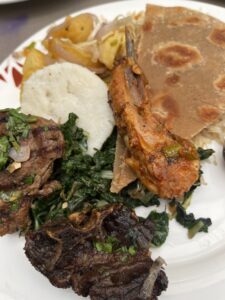
Chapati (flat bread), Sukima Wiki (greens), Ugali (corn meal), Nyama Choma (grilled lamb), Wali (rice)
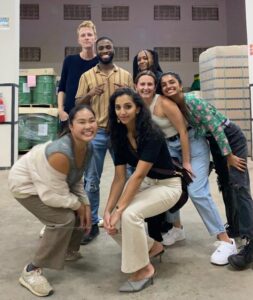
6/8 PiAf Kenya Fellows!
Hello! My name is Kyilah Terry, and I am the Grants and Reporting Fellow at the International Rescue Committee (IRC) in Nairobi, Kenya. The IRC is a humanitarian organization that helps refugees and other forcibly displaced people gain the tools to rebuild their lives, which have been upended by conflict and climate disasters. Before coming to Nairobi, I was living in Washington D.C., working for the Office of the Vice President- where I was also working on migration-related issues!
At the IRC, my main responsibilities include managing grants for our USD 15 Million+ grants portfolio covering health, protection, nutrition, and women’s protection and empowerment (WPE) programs in Kakuma and Dadaab refugee camps, and urban projects in Nairobi. Kakuma and Dadaab are actually the largest refugee camps in the world with many of the refugees coming from Somalia, Ethiopia, and Sudan. I also ensure project teams adhere to donor obligations (ECHO, BPRM, UNHCR, UNW) relating to reporting requirements, project deliverables, visibility, and partnerships, through virtual communication and in-person field visits!
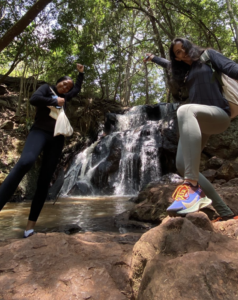
Karura Forest Waterfall with IRC Kenya Fellows: Aishwarya and Kyilah
Outside of work, I am learning the local language: Swahili. Swahili is actually the lingua franca of most of East Africa and is so fun to learn! Similar to English, there are no gendered nouns; however, there are also no conjugations! Instead of conjugating there is often a prefix that symbolizes who is doing the action and a verb tense following the prefix that represents the type of verb. I am taking a class at the Language School of Kenya and study for about 10 hours a week. It is my hope to speak at the advanced level before I leave!
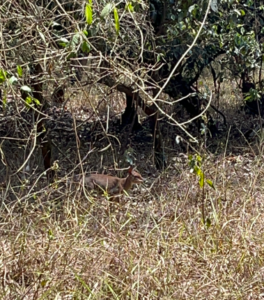
The world’s smallest antelope, a Dik-dik!
In addition to learning the language, I am enjoying all of the amazing sites that Kenya has to offer. So far, a few other PiAf fellows and I have gone to Karura forest, where we saw the world’s smallest antelope called a dik-dik; we’ve also been to the Giraffe center, where we saw the world’s largest antelope! After these excursions, dinner plans usually include trying a variety of Kenyan foods, including Nyama Choma and Ugali, which is grilled lamb and corn meal!
After the fellowship year, I will be getting my Ph.D. in Political Science when I leave the fellowship in August 2023. My research will center around climate-induced displacement in Eastern Africa and migration to Europe. Working in East Africa with a refugee resettlement organization and managing large grants from European governments is a perfect segue!
Notes from the Field
By Asa Cooper, '22-'23 Fellow with the International Rescue Committee in Somalia (based in Kenya)
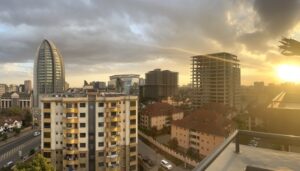
Nairobi, Kenya
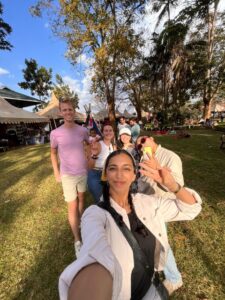
Asa with other Kenya-based 2022-23 Fellows!
Hello everyone! My name is Asa and I am working as a Grants and Programs Fellow for the International Rescue Committee (IRC) Somalia based in Nairobi, Kenya. It has been an incredibly rewarding experience so far and I am excited to be applying what I learned through my studies in such a practical and impactful way. My work largely revolves around emergency responses to the current drought across Somalia. This involves coordinating and managing grants from major international donors such as the European Commission, United Nations, and Swedish International Development Cooperation Agency. IRC takes an excellent bottom-up approach to programming, and I am able to communicate directly with my Somali coworkers in the field to assist in designing programs that are tailored to different communities’ needs and appropriate for local contexts. This has allowed me to gain a deeper understanding of Somalia and the role that the humanitarians play in the country. The opportunity to work alongside committed professionals from across East Africa has greatly enriched my experience and introduced me to new and diverse ideas, cultures and ways of working while consistently reminding me of how we are all deeply connected through our common humanity.
I am always telling my friends and family that living in Nairobi is both a wonderful and huge adjustment. The beautiful weather, friendly people and incredible food has made the move here much easier (not to mention the wide variety of birds which those who know me will know how excited I am about that). I have enjoyed dancing to Afro beats with locals who celebrate my awkward dancing, discussing liberation philosophy with passionate intellectuals and piecing together broken sentences in Swahili with taxi drivers who are excited to hear about where I come from. At the same time, living in a country that is grappling with the effects of neocolonialism, global racism and exploitative economic expansion often brings me face-to-face with cruel inequalities. In a way, I am most grateful for these uncomfortable moments as I am forced to confront my own privilege and the failures of my chosen field of work, but I am also reminded of why I chose this field in the first place. I feel very lucky to be in a position to learn how I can best contribute to addressing these longstanding issues alongside talented and hardworking people who share my interests and passion to make the world a better place. I am not even two months into my time here but I am already certain that my time as a Princeton in African fellow will be an experience that profoundly shapes the rest of my life.
Notes from the Field
By Dylan McAndrew, '22-'23 Fellow with the African School of Economics in Benin
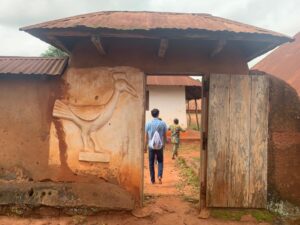
Walking into one of the royal palaces in Abomey, capital of the Danxome Kingdom
Hello! My name is Dylan McAndrew and I am the Project Coordinator and Communications fellow for the African School of Economics (ASE) located in Abomey-Calavi, Benin. Although only three months into my fellowship, it has proven to be engaging because of my work, personal experiences, and new routines.
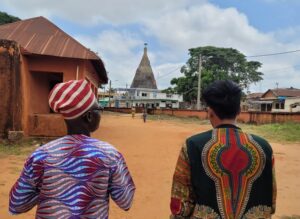
Entering the foyer of the royal palace of Porto Novo, Benin’s administrative capital
As part of the marketing and communications department, tasks change with the season, making my day-to-day unpredictable. On my first day on the job, I was told we were heading to the University of Abomey-Calavi, the largest university in Benin, where we would hand out flyers to a huge line of undergrad students waiting to receive their test scores. More of an introvert, I was hesitant to approach passers-by, especially in a brand new country using a different language (French). I quickly realized distributing flyers (“field” marketing) would be a common task during the summer recruitment period. I adapted, and slowly grew to appreciate the challenge. Through field marketing, I found myself at an Afrobeats concert, high school test sites, and open-air markets around universities. I learned marketing here is relational and personal, very different from the data-driven approaches I learned in school.
As an aspiring documentary filmmaker, I also put my video editing and videography skills to use. I take pictures and videos at ASE events, edit archival footage and content for social media, and have planned a “day in the life” video series highlighting the daily activities of students. Additionally, I write news articles, make cold calls, and introduce guest speakers.
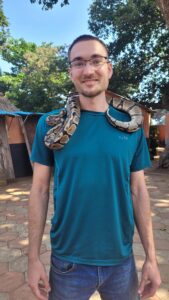
Dylan holding a python at the Python Temple in Ouidah
Outside of work, Benin is a fascinating country with a rich, complex history and culture, and the local people seem to take pride in this. While there is of course the Vodoun religion, which I have yet to thoroughly explore, I have seen important historical sites of the Danxome kingdom, a powerful administrative state in the south of Benin. From the royal palaces at Abomey to the Slave Route in Ouidah, I saw both magnificent yet disturbing realities of the Danxome Kingdom. Even more timely and interesting was the fact that this was the same kingdom featured in the Hollywood film The Woman King. In fact, the founder and president of ASE, Dr. Wantchekon, was the historical consultant for the film, further deepening my curiosity about Benin’s history.
My daily life here is also vastly different from my former life in suburban Austin, Texas. In Benin, I have found a microcosm of community just from my routine of buying fruit at a small outdoor corner market. I have become friends with many of the people I pass en route; the “orange” lady Leocadie (she sells oranges and cell phone credit), Fadilath, the corner store worker who I bought bed sheets from, and Rita, who works at the maquis and sells us pounded yams. In the U.S. I viewed errands as going from point A to point B, but here I see it as a connective, stimulating ritual.










